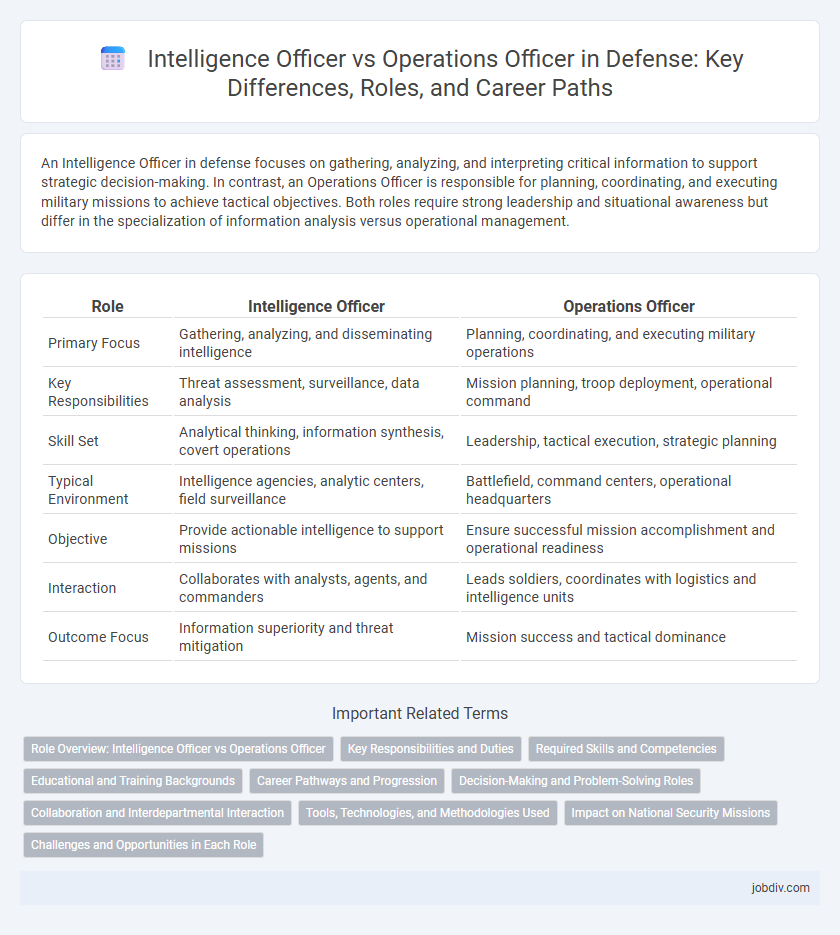An Intelligence Officer in defense focuses on gathering, analyzing, and interpreting critical information to support strategic decision-making. In contrast, an Operations Officer is responsible for planning, coordinating, and executing military missions to achieve tactical objectives. Both roles require strong leadership and situational awareness but differ in the specialization of information analysis versus operational management.
Table of Comparison
| Role | Intelligence Officer | Operations Officer |
|---|---|---|
| Primary Focus | Gathering, analyzing, and disseminating intelligence | Planning, coordinating, and executing military operations |
| Key Responsibilities | Threat assessment, surveillance, data analysis | Mission planning, troop deployment, operational command |
| Skill Set | Analytical thinking, information synthesis, covert operations | Leadership, tactical execution, strategic planning |
| Typical Environment | Intelligence agencies, analytic centers, field surveillance | Battlefield, command centers, operational headquarters |
| Objective | Provide actionable intelligence to support missions | Ensure successful mission accomplishment and operational readiness |
| Interaction | Collaborates with analysts, agents, and commanders | Leads soldiers, coordinates with logistics and intelligence units |
| Outcome Focus | Information superiority and threat mitigation | Mission success and tactical dominance |
Role Overview: Intelligence Officer vs Operations Officer
An Intelligence Officer analyzes and interprets classified information to support military decision-making and strategic planning, focusing on threat assessment and enemy capabilities. An Operations Officer coordinates and manages military missions, overseeing tactical execution and resource allocation to achieve operational objectives. Both roles are pivotal in defense, with Intelligence Officers providing critical data insights and Operations Officers directing field activities.
Key Responsibilities and Duties
Intelligence Officers specialize in gathering, analyzing, and disseminating critical information to support mission planning and threat assessment, utilizing advanced data analysis tools and human intelligence sources. Operations Officers focus on executing and managing tactical missions, coordinating personnel, logistics, and resources to achieve strategic objectives in dynamic environments. Both roles demand expertise in decision-making, risk assessment, and effective communication to ensure mission success within defense organizations.
Required Skills and Competencies
Intelligence Officers require strong analytical skills, proficiency in data interpretation, and expertise in threat assessment to identify and evaluate potential security risks. Operations Officers must excel in strategic planning, leadership, and real-time decision-making to effectively coordinate missions and manage personnel under high-pressure conditions. Both roles demand exceptional communication abilities and adaptability, but Intelligence Officers emphasize information synthesis while Operations Officers focus on tactical execution.
Educational and Training Backgrounds
Intelligence Officers typically hold degrees in criminal justice, political science, or cybersecurity and undergo specialized training in data analysis, threat assessment, and espionage techniques. Operations Officers often possess backgrounds in international relations, military science, or strategic studies, receiving rigorous training in field operations, covert action, and tactical planning. Both roles require continuous professional development through advanced courses at institutions like the Defense Intelligence Agency or the National Security Agency to maintain operational effectiveness.
Career Pathways and Progression
Intelligence Officers specialize in gathering, analyzing, and interpreting information to support strategic decision-making, often advancing through roles such as Intelligence Analyst, Senior Intelligence Officer, and Intelligence Director. Operations Officers focus on planning, executing, and coordinating tactical missions, with career progression typically moving from Field Officer to Operations Manager and then to Operations Commander. Both pathways require advanced training and leadership development, but Intelligence Officers emphasize cognitive skills and data analysis, while Operations Officers prioritize operational expertise and command experience.
Decision-Making and Problem-Solving Roles
Intelligence Officers analyze data from multiple sources to provide actionable insights, enabling strategic decision-making and anticipatory problem-solving in defense operations. Operations Officers implement missions by coordinating resources and personnel, making real-time decisions to adapt to dynamic combat environments and solve tactical challenges. Both roles demand critical thinking and rapid response, but Intelligence Officers focus more on predictive analysis, while Operations Officers emphasize execution and immediate operational effectiveness.
Collaboration and Interdepartmental Interaction
Intelligence Officers and Operations Officers collaborate closely to ensure mission success through seamless interdepartmental coordination. Intelligence Officers provide critical data analysis and threat assessments that inform Operations Officers' strategic planning and tactical execution. Their ongoing interaction enhances situational awareness and decision-making, fostering a unified defense capability across intelligence and operational units.
Tools, Technologies, and Methodologies Used
Intelligence Officers primarily utilize advanced data analysis software, signals intelligence (SIGINT) tools, and geospatial intelligence (GEOINT) platforms to collect, analyze, and interpret information from diverse sources. Operations Officers focus on field communication systems, covert surveillance technologies, and human intelligence (HUMINT) methodologies to conduct missions and manage tactical operations. Both roles rely on secure communication networks, cyber tools for information security, and collaborative software to ensure seamless coordination in defense environments.
Impact on National Security Missions
Intelligence Officers analyze and interpret critical data to anticipate threats, enhancing decision-making accuracy for national security missions. Operations Officers execute strategic plans and coordinate field activities, ensuring mission objectives are achieved efficiently. Both roles are pivotal, with Intelligence Officers providing the actionable insights that shape operational tactics, directly influencing the success and safety of national security efforts.
Challenges and Opportunities in Each Role
Intelligence Officers face challenges in synthesizing vast amounts of data under tight deadlines, requiring strong analytical skills to provide actionable insights that directly impact mission success. Operations Officers confront the complexities of coordinating tactical deployments and resource management in dynamic environments, demanding real-time decision-making and leadership under pressure. Both roles offer opportunities for specialization: Intelligence Officers can advance in cyber and signals intelligence, while Operations Officers gain experience in strategic planning and interagency collaboration.
Intelligence Officer vs Operations Officer Infographic

 jobdiv.com
jobdiv.com